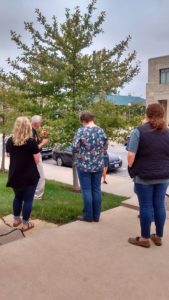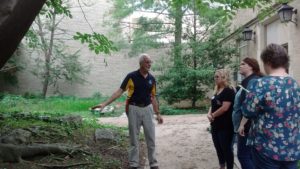Final report for ENC16-154
Project Information
With significant advances in the science of agroforestry over the last 20 years, ongoing agroforestry education programs for natural resource professionals have fostered awareness of the opportunities to combine productivity, profitability and environmental stewardship. However, agroforestry is not yet represented in secondary education environments. A growing number of Missouri’s agriculture students, increasing from 13,325 in 1985 to 28,664 in 2015, are exposed to agricultural focus areas that guide their life-long career paths. More than half of these students will pursue an agricultural profession after high school. This project, a collaboration between the University of Missouri (MU) Center for Agroforestry (UMCA), MU Dept. of Agriculture Education and Leadership, and the Missouri Department of Elementary and Secondary Education (DESE) with FFA, will provide six 2-day Agroforestry Summer Institutes to train 90 high school Missouri agriculture educators between 2017 and 2019. Missouri’s FFA curriculum development groups are currently redesigning the Agriculture Science II course, which will include an experience-based six-module agroforestry unit (at least one-week duration during the school year) that will integrate sustainable land use models exemplified by agroforestry into the foundational education of young farmers and agriculture professionals. However, educator delivery of an agroforestry curriculum depends on educator understanding of the curriculum material. To prepare educators to use this new curriculum for the advancement of their students’ professional applications of sustainable agriculture, an Agroforestry Summer Institute will be created to prepare educators with the tools and materials needed to teach the agroforestry unit in their high school Agriculture Science II classes.
Create experiential agroforestry high school curriculum.
The agroforestry curriculum described in the above resource section is the foundational resource from which agriculture educators will be able to transfer agroforestry content to the high school classroom. The curriculum will include extensive educator resources and materials adaptable to a broad range of class sizes and durations, with a focus on experiential methods of instruction including problem-solving student collaboration, engagement with regional farmers, and application of agroforestry practices, planning and design.
Curriculum content will be developed by: Ms. Hannah Hemmelgarn, MS Graduate Research Assistant and experiential educator; Dr. Anna Ball, University of Missouri Agriculture Education and Leadership Dept. Chair; Dr. Hank Stelzer, University of Missouri Forestry Dept. Chair and State Forestry Extension Specialist; and Dr. Michael Gold, Associate Director UMCA. Content will consist of a 6-module (1-week) portion of the larger forestry unit within Agriculture Science II, an upper level high school agriculture class that prepares 5,357 students in Missouri for the Supervised Agricultural Experience Program, Career Development Events, and students’ agricultural professional foci.
The experiential pedagogy of the agroforestry curriculum is based on Missouri high school agriculture educator feedback (UMCA research in progress) and personal communication with FFA-DESE curriculum developers who recognize the need for hands-on, peer-to-peer approaches for engaging, effective lessons. Research on the use of experiential learning in secondary agriculture education classrooms reveals that students’ subject matter retention increases, students engage more actively and use higher order thinking skills towards greater academic success when educators directly involve the learner in the phenomena being studied.
The curriculum materials, including an agroforestry resource compendium, will be available to educators on the DESE agriculture curriculum website, on the Center for Agroforestry website, and in the Educator Hub of the interactive Perennial Systems Map developed by the Savanna Institute. Additionally, the Center for Integrated Agriculture Systems (CIAS) “Toward a Sustainable Agriculture” curriculum will include the agroforestry unit lessons in the Stewardship module VI available publicly online.
b) Recruit educators for summer institutes.
Spring recruitment of educators with assistance from state and national agriculture education partners and project advisory committee members will precede Agroforestry Summer Institutes to confirm the number of participating educators, their location and travel requirements, their background knowledge and expertise. Educators will prepare for the training in advance with a follow-up confirmation and assignment to review a set of agroforestry resources in order to assure the most effective use of training time for educator practice and understanding.
Current agriculture secondary educator research (UMCA, in progress) indicates that educator interest in attending an Agroforestry Summer Institute is based on available funds for registration fee support, relevance to Career Development Events (CDE), and time availability (2-day training duration is preferred).
c) Create educator training syllabus and resource compendium.
In partnership with UMCA faculty and staff, agroforestry collaborators (Mid-America Agroforestry Working Group, USDA National Agroforestry Center, Assn for Temperate Agroforestry), and agriculture educator groups (FFA, NAAE, NACAA, SAEA), a resource compendium specifically relevant and accessible to agriculture educators will be compiled and made available electronically. The resource compendium will include the Agroforestry Training Manual, Agroforestry Practice videos, and the Handbook for Agroforestry Planning and Design. These materials will be adapted to meet the needs of secondary educators, as well as an interactive map generated by the Savanna Institute that identifies agroforestry practitioners, organizations, and fellow educators that may serve as a Midwest regional resource for direct engagement between students and communities. Within the Savanna Institute’s interactive Perennial Map, an Educator Hub will house all curriculum and training resources publicly.
Based on the agroforestry curriculum modules, the educator-training syllabus will include a schedule and outline of content and activities associated with the Agroforestry Summer Institutes, which may be distributed to partnering agriculture educator professional development organizations.
d) Conduct six 2-day Agroforestry Summer Institutes.
Two Agroforestry Summer Institute educator trainings will take place during each year of the grant at various locations throughout the State of Missouri. These trainings will include hands-on experiential components for educators to practice agroforestry curriculum lessons as both educator and student. Additionally, educators will have an opportunity to interact with UMCA researchers and agroforestry practitioners’ first-hand, visit agroforestry demonstrating one or more of the 5 agroforestry practices referenced in the curriculum, and directly practice high school curriculum assignments and activities including a group agroforestry design presentation. Student Supervised Agricultural Experience Program projects can be drawn directly from these experiences and networks. Together, these components of the Summer Institute will equip educators to deliver the agroforestry curriculum upon completion of the training. Fifteen educators will attend each training, for a total of 90 Missouri agriculture educator professionals.
The Agroforestry Summer Institutes provide Missouri agriculture secondary educators with a connection to the agroforestry content and creative ability to collaborate with the curriculum developers to best meet their needs and the needs and interests of their students for effective delivery of agroforestry content that is currently underrepresented in the high school agriculture science classroom.
e) Disseminate materials and methods.
Curriculum development and professional training institutions for agriculture educators including SAEA, NACAA, NAAE, NAAC and FFA will be provided with the educator training syllabus, curriculum materials, and resource compendium for agroforestry education delivery opportunities nation-wide. Conference presentations about the agroforestry curriculum and Agroforestry Summer Institutes will take place at the Sustainable Agriculture Educator Association (SAEA) and North American Agroforestry Conference (NAAC) biennial conferences. An educator training based on the Agroforestry Summer Institutes will also be delivered as a 2.5 hour Professional Improvement Council Seminar at the National Association of County Agricultural Agents (NACAA) 2017 meeting, and at the Association for Career and Technical Education (ACTE) 2018 conference in order to advance the reach of professional training.
Timeline
- April 2017: Finalize the 6-module experiential agroforestry curriculum for inclusion in the updated Agriculture Science II class curriculum posted by FFA in collaboration with DESE, in the CIAS “Toward a Sustainable Agriculture” curriculum, and on the Education Hub of the Savanna Institute’s Perennial Map.
- April 2017, 2018, 2019: Recruit Missouri secondary agriculture educators for participation in Agroforestry Summer Institutes, deliver pre-Institute surveys.
- May 2017: Compile agriculture educator agroforestry resource compendium to reflect educator uses of the Agroforestry Training Manual and Handbook for Agroforestry Planning and Design.
- June 2017, 2018, 2019: Produce agriculture educator agroforestry resource compendium in print for participating agriculture educators.
- June 2017, 2018, 2019: Conduct 2 agroforestry summer institutes per year at the New Franklin, MO HARC farm for up to 15 educators per Institute.
- July 2017, 2018, 2019: Receive post-Institute feedback from educators for the continuous improvement of the professional development program.
- July 2017, 2018, 2019: Create an online directory and network of agriculture educators employing the agroforestry curriculum for ongoing resource exchange on the Savanna Institute Perennial Map Educator Hub, updated prior to each training.
- July 2017, 2018, 2019: Conduct end-of-program evaluation meetings, receive and evaluate educator and student post-curriculum delivery surveys and assessments.
- 2017, 2018, and 2019: Share materials and methods at partner organization conferences for the continued dissemination of agriculture educator agroforestry trainings. Present short courses for educators at two educator professional meetings (Association for Career & Technical Education (ACTE), National Association of County Agricultural Agents (NACAA). Present on PDP Summer Institute (lessons learned and curriculum) at two professional conferences (North American Agroforestry Conference (NAAC), Sustainable Agriculture Education Assn (SAEA) Conference);
Outputs
- Release of 6-module agroforestry curriculum for high school students in Agriculture Science II.
- Conduct six educator training Agroforestry Summer Institutes, 2 per year over 3 years for a total of 90 agriculture educators trained in Missouri.
- Educator training syllabus, curriculum materials and resource compendium made available online through UMCA, DESE, NAC, NCR-SARE, CIAS, and Savanna Institute websites, and promoted for national release.
- Agriculture educator directory made available online through UMCA, DESE, NCR-SARE, NAC, AFTA websites, for networking and resource sharing among current and future educators implementing agroforestry units.
- Agroforestry farmer directory available in collaboration with the Savanna Institute as a student and educator field resource on the Perennial Map Educator Hub.
- Certificates of completion and continuing education credits awarded to participating agriculture educators.
Cooperators
Education
The Agroforestry Summer Institutes ("teacher workshops") developed and delivered for this project are designed to meet the needs of high school agriculture instructors whose summers are often busy, and whose schools may not provide funding for professional development programs.
Additionally, the Agroforestry curriculum developed for this project has been made available as open-access public files on the Box file sharing platform. Since the materials were posted in 2018 (available at www.centerforagroforestry.org), more than 100 unique downloads of the curriculum files have been recorded.
2017:
Two ASI programs were planned for the summer of 2017, each two-days in duration and provided at no cost. Program recruitment and registration was administered through the University of Missouri Agricultural Education and Leadership professional development specialist. There were not enough teachers registered for the program intended to be held in Kirksville, MO, so those teachers who were signed up for this program were asked to attend the program offered in Mount Vernon, MO. The program itself was conducted with a focus on experiential approaches to learning: using problem- and project-based, hands-on, and peer-to-peer methods to prepare this cohort of 15 educators to deliver an agroforestry unit curriculum.
2018:
Two ASI programs were planned and delivered in the summer of 2018. Program recruitment and registration was again administered through the University of Missouri Agricultural Education and Leadership professional development specialist, in addition to an open registration (for other educators who expressed interest in learning and disseminating these materials) through the Univ. of MO Center for Agroforestry. Twelve high school agriculture teachers registered and attended a one-day program in Springfield, MO at the Darr Agricultural Center on July 23rd; Nine high school agriculture teachers and three other educators (high school biology, master naturalist, and MDC education consultant) - twelve total - registered and attended the two-day program in Kirksville, MO at the Truman State University farm and at the Kirksville high school outdoor classroom. A total of 24 educators were trained in 2018 to employ the updated agroforestry unit curriculum, with an additional forestry segment and soil health segment.
2019:
Two ASI programs were scheduled for the summer 2019, in addition to distribution of materials via the Missouri Vocational Agriculture Teachers Assoc. (MVATA); however registration for the 2019 workshops was particularly low. Our partners for recruitment (Missouri Agricultural Education and Leadership) indicated that typically a themed PDP for teachers is not offered in concurrent years, as this one has been, resulting in a maxing out of those teachers who are interested in attending for agroforestry-specific content. As a result, one of the two programs was cancelled, and one two-day ASI was held in Columbia, MO at the MU campus, as a central location offering. Seven educators registered and attended the Columbia workshop, which included classroom instruction, peer-to-peer and problem-solving approaches, a forestry field experience, and an additional hands-on soil health segment. Despite reduced attendance, participating educators were eager to learn and share the materials with their colleagues, and to encourage their students to apply the project-based components to Supervised Agricultural Experience Projects.
2020:
As an extension of this project, and in response to the COVID-19 restrictions we collectively faced, we shifted our focus in 2020 to offer updated and expanded materials specifically for virtual education platforms, and shared these resources widely with agricultural science educators in Missouri and beyond. While web analytics do not reveal exactly how many of those who accessed these materials were educators, the additional access and function of these materials allowed for a far-reaching approach that will continue to serve educators in virtual and in-person settings.
Education & Outreach Initiatives
1. Recruit educators for summer institutes;
2. Create educator training syllabus and resource compendium;
3. Conduct professional development programs to prepare at least 15 high school agricultural educators to deliver an agroforestry curriculum in their high school agriculture program.
In the spring of 2017, the Agroforestry Curriculum (teaching materials for a 2-module unit on agroforestry) was further developed and refined for presentation to teachers who attend an ASI program and for the MO Dept. of Education-FFA curriculum development group to include in the updated state curriculum.
The 2017 Agroforestry Summer Institute was held on June 22nd-23rd at the Southwest Research Center in Mount Vernon, MO and at the Mount Vernon high school from 10:00am-8:00pm on day 1 and 8:30am to 3:00pm on day 2. Fifteen (capacity based on classroom space) educators attended the workshop representing 3 of the 6 agriculture education regions in the state, having traveled between 5 minutes and 3 hours in personal vehicles to attend.
This professional development program included classroom instruction from Dr. Hank Stelzer (MU Forestry Extension) on updated state forestry curriculum, Dr. Mike Gold (MU Center for Agroforestry), and Hannah Hemmelgarn (MU Center for Agroforestry) on agroforestry practices and teaching materials provided in the updated state curriculum. Teachers also participated in problem-solving activities as outlined in the agroforestry curriculum designed by the Center for Agroforestry, and were given opportunities to teach their peers, applying their new knowledge about agroforestry to classroom practice. The high school agriculture teachers at the Mount Vernon high school also shared their space and experience establishing a school food forest as a way to include agroforestry content with project-based learning. Hands-on activities, including tree measurements and mushroom log inoculation were also included in the program. A complete agenda of the PDP is included in the project products.
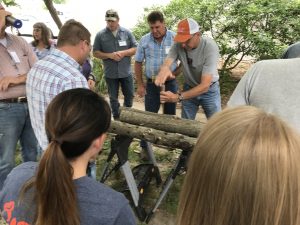
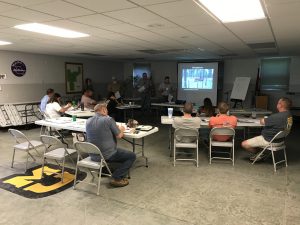
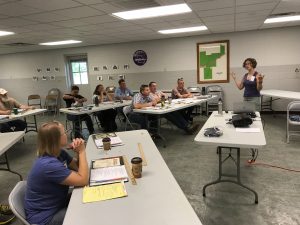
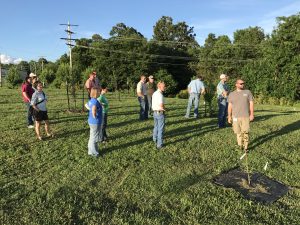
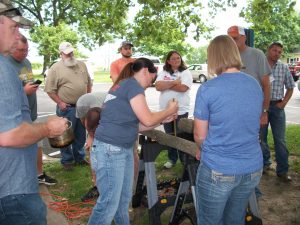
An agroforestry curriculum is now available as a 2-module unit with teaching materials and student activities relevant to Missouri agriculture science. This curriculum was provided as a printed document to all teachers who attended an ASI, and is available as a PDF to those who request it electronically.
Pre- and post-ASI evaluative surveys revealed substantial gains in learning and action outcomes. Before the workshop, 67% of participants reported no prior agroforestry training or experience. When asked to define "agroforestry", teachers lacked clarity and accuracy, often describing agroforestry as silviculture. Following the workshop, the teachers' definitions of agroforestry indicated their understanding that agroforestry includes conservation/ ecosystem services, marketable products, intensive management, and integrated agricultural systems with trees/shrubs (73% of participants provided definitions that included all of these components, compared to 0% at the outset).
Prior to the workshop, teachers reported spending a total of 179 hours on agroforestry-related topics in class. After the workshop, teachers expected to spend a total of 294 hours in class on agroforestry topics. These topics, in order from greatest to least amount of change in classroom hours are: agroforestry planning (15.5 added hours), alley cropping (15 added hrs), marketing agroforestry products (15 added hrs), riparian forest buffers (12.5 added hrs), forest farming (12 added hrs), silvopasture (11 added hrs), windbreaks (9.5 added hrs), economic and financial tools for agroforestry (9 added hrs), wildlife benefits of agroforestry (7.5 added hrs), and timber stand improvement (7.5 added hrs).
1. Recruit educators for summer institutes;
2. Create educator training syllabus and resource compendium;
3. Conduct professional development programs to prepare at least 12 high school agricultural educators to deliver an agroforestry curriculum in their high school agriculture program.
Further additions to the Agroforestry Curriculum were included in the spring 2018 edition, including an expanded resource section including funding opportunities for hands-on agroforestry education and installation, and more in-depth instructional materials for mushroom cultivation and short-rotation woody crop cultivation.
The first 2018 Agroforestry Summer Institute was held on June 21st and 22nd in Kirksville, MO at the Truman State University farm and Kirksville high school outdoor classroom, from 10:00am-8:00pm on day 1 and 8:30am to 4:00pm on day 2. Twelve educators attended the workshop.
This professional development program included classroom instruction from Dr. Hank Stelzer (MU Forestry Extension) on updated state forestry curriculum, Dr. Mike Gold (MU Center for Agroforestry), and Hannah Hemmelgarn (MU Center for Agroforestry) on agroforestry practices and teaching materials provided in the updated state curriculum. Teachers also participated in problem-solving activities as outlined in the agroforestry curriculum designed by the Center for Agroforestry, and were given opportunities to teach their peers, applying their new knowledge about agroforestry to classroom practice. Hands-on activities, including tree measurements and mushroom log inoculation were also included in the program. Additionally, during this PDP, Sandra Arango-Caro of the Danforth Center, led the group in a hands-on soil health assessment workshop and provided tools for each teacher to replicate the activity with their students. A complete agenda of the PDP is included in the project products.
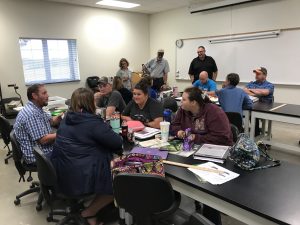
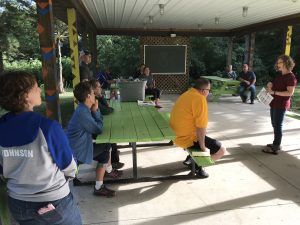
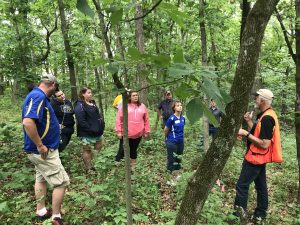
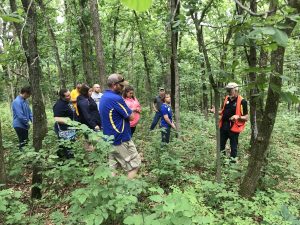
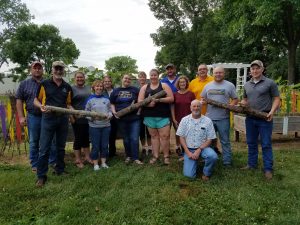
An agroforestry curriculum is available as a 2-module unit with teaching materials and student activities relevant to Missouri agriculture science. This curriculum was provided as a printed document (binder) and as an electronic set of files on a flash drive to all teachers who attended an ASI. In August, 2018, the digital curriculum files were made available publicly on the UMCA website. Since they were posted, there have been 50 unique downloads of the materials.
Pre- and post-ASI evaluative surveys revealed substantial gains in learning and action outcomes. Before the workshop, 100% of participants reported no prior agroforestry training or experience. Similar to 2017 knowledge growth, when asked to define "agroforestry", teachers again lacked clarity and accuracy, often describing agroforestry as silviculture. Following the workshop, the teachers' definitions of agroforestry indicated their understanding that agroforestry includes conservation/ ecosystem services, marketable products, intensive management, and integrated agricultural systems with trees/shrubs.
Prior to the workshop, the group of teachers reported spending a total of 89 hours on agroforestry-related topics in class. After the workshop, teachers expected to spend a total of 160 hours in class on agroforestry topics. These topics, in order from greatest to least amount of change in classroom hours are: agroforestry planning (19 added hours), marketing agroforestry products (16.5 added hrs), wildlife benefits of agroforestry (14.5 added hrs), economic and financial tools for agroforestry ( 14.5 added hrs), alley cropping (11 added hrs), forest farming (9 added hrs), silvopasture (9 added hrs), riparian forest buffers (8 added hrs), timber stand improvement (7.5 added hrs), and windbreaks (6 added hrs).
1. Recruit educators for summer institutes;
2. Create educator training syllabus and resource compendium;
3. Conduct professional development programs to prepare at least 12 high school agricultural educators to deliver an agroforestry curriculum in their high school agriculture program.
The second 2018 Agroforestry Summer Institute was held on July 23rd in Springfield, MO at the Darr Agricultural Center, from 9:00am until 2:00pm. Twelve high school agriculture educators attended the workshop. This shortened program was developed to reach a captive audience of educators at the outset of the annual Missouri Association for Career and Technical Education conference. Teachers were invited to attend to learn about agroforestry, and to share their experiences applying agroforestry in the ag classroom.
This professional development program included classroom instruction from Dr. Hank Stelzer (MU Forestry Extension) on updated state forestry curriculum, and Hannah Hemmelgarn (MU Center for Agroforestry) on agroforestry practices and teaching materials provided in the updated state curriculum. Teachers also participated in problem-solving activities as outlined in the agroforestry curriculum designed by the Center for Agroforestry, and were given opportunities to teach their peers, applying their new knowledge about agroforestry to classroom practice. A hands-on mushroom log inoculation activity and agroforestry design activity was also included in the program. A complete agenda of the PDP is included in the project products.
An agroforestry curriculum is available as a 2-module unit with teaching materials and student activities relevant to Missouri agriculture science. This curriculum was provided as a printed document (binder) and as an electronic set of files on a flash drive to all teachers who attended an ASI.
Pre- and post-ASI evaluative surveys revealed substantial gains in learning and action outcomes associated with teacher efficacy with the new content. Prior to the workshop, the group of teachers reported spending a total of 43 hours on agroforestry-related topics in class. After the workshop, teachers expected to spend a total of 145 hours in class on agroforestry topics. These topics, in order from greatest to least amount of change in classroom hours are: agroforestry planning (15 added hours), alley cropping (14 added hrs), silvopasture (14 added hrs), riparian forest buffers (11 added hrs), windbreaks (10 added hrs), wildlife benefits of agroforestry (10 added hrs), forest farming (9 added hrs), marketing agroforestry products (8 added hrs), timber stand improvement (6 added hrs), and economic and financial tools for agroforestry (5 added hrs).
1. Recruit educators for summer institutes;
2. Create educator training syllabus and resource compendium;
3. Conduct professional development programs to prepare high school agricultural educators to deliver an agroforestry curriculum in their high school agriculture program.
The 2019 Agroforestry Summer Institute was held on June 17-18 in Columbia, MO at the University of Missouri Campus and nearby Columbia Center for Urban Agriculture farm. Seven high school agriculture educators attended the workshop, held from 10:00am-8:00pm on day 1 and 8:30am to 4:00pm on day 2.
This professional development program included classroom instruction from Hannah Hemmelgarn (MU Center for Agroforestry) on agroforestry practices and teaching materials provided in the updated state curriculum, Dr. Hank Stelzer (MU Forestry Extension) on updated state forestry curriculum, and Dr. Mike Gold (MU Center for Agroforestry). As in previous years, teachers participated in problem-solving activities, peer-to-peer teaching/learning, and hands-on experiences as outlined in the agroforestry curriculum. Hands-on activities, including tree measurements, mushroom log and mulch bed inoculation, and a field tour of perennial woody plants both on campus and at the CCUA urban farm were also included in the program. Additionally, during this PDP, Sandra Arango-Caro of the Danforth Center, returned to lead the group in a hands-on soil health assessment workshop and provided tools for each teacher to replicate the activity with their students. A complete agenda of the PDP is included in the project products. 2019 workshop presentation guide: Teacher Workshop_Columbia
An agroforestry curriculum is available as a 2-module unit with teaching materials and student activities relevant to Missouri agriculture science. This curriculum was provided as a printed document (binder) and as an electronic set of files on a flash drive to all teachers who attended the ASI. Participating teachers were also directed to the publicly available online curriculum materials as an easy way to find updated material and extended resources to share with colleagues.
While the 2019 educator trainee group was smaller than previous years, pre- and post-ASI evaluative surveys revealed consistent gains in learning and action outcomes associated with teacher efficacy with the new content. The smaller group size in fact may have improved learning outcomes due to increased discussion and problem-solving time. Total class hours intended for agroforestry-related topics more than quadrupled as a result of the workshop,with greatest increases in agroforestry planning, alley cropping, forest farming, silvopasture, riparian forest buffers, and economic & financial considerations.
The group consisted primarily of new teachers looking to fill content gaps, and indicated that practice teaching the material with their students would be the most useful next step. They rated the workshop as entirely satisfactory in all areas: quality and quantity of material, discussion time, usefulness of content, access and affordability.
With the COVID-19 pandemic upending all face-to-face education and training events in 2020, our objectives shifted from in-person professional development, to the creation of accessible curricular and other educational materials and events for sharing these materials online. Our objectives in this new format are as follows:
1. Shift UMCA educational materials, as an extension of the HS curriculum and training, to an online format;
2. Ensure that materials are accessible, informative, appealing, and relevant for agriculture science educators;
3. Host virtual events to share these resources and the platforms where they’re housed.
While this content has benefits that reach beyond the high school teacher audience, special attention was paid to ensure that teachers are able to navigate this newly added online content to increase their ability to educate their students about agroforestry.
Throughout 2020, the Center for Agroforestry’s website has undergone a complete design overhaul and content update from the previously outdated and difficult to navigate format. The efforts applied to website renovation will be live in spring 2021. In the meantime, current web resources have been maintained and kept current.
In March 2020, Center for Agroforestry faculty and staff pulled together an Open Access Online Curriculum which serves to expand and make more flexible the existing high school curriculum. This new 3-module set of multi-media materials and guides are specifically geared to online teaching, in order to address the urgent need for educators to shift from in-person to online teaching. This curriculum is available at http://www.centerforagroforestry.org/education/AgroforestryIntro-OnlineCurriculum.pdf.
In October 2020, in conjunction with the Annual Missouri Chestnut Roast Festival (a virtual event in 2020) the Center for Agroforestry’s and Horticulture and Agroforestry Research Center created and released the “Mizzou Agroforestry” YouTube channel. New video content is being posted weekly on the channel, currently showing over 330 subscribers.
https://www.youtube.com/channel/UCUOh8LRAf21gW2dt3uPf_UA
Included in the 2020 YouTube content are agroforestry specialty crop production videos on elderberry, pecan and chestnut production. To date, the Elderberry Culture video by Patrick Byers, MU Extension Horticulture Specialist, has been viewed over 3,300 times; the Growing Elderberries – Challenges and Practices video by Alan Helland, elderberry producer, has been viewed 1,200 times; and the Chestnut Production video by Michael Gold has been viewed 1,500 times. In addition, a series of videos, including experts and producers, introduced maple syrup production as a forest farming option for Missouri landowners. Agricultural educators were invited to participate in this channel launch, although YouTube analytics does not show how many of these views are educators.
A “Nutshell Conversations” webinar series, jointly developed by the Center for Agroforestry’s Hannah Hemmelgarn and the Savannah Institute, was established in 2020. Nutshell Conversation are hosted monthly and subsequently posted to the Mizzou Agroforestry YouTube Channel. In 2020, two Nutshell Conversations were conducted: 1) Polyculture Farms; and 2) Agroforestry Training, Education and Career Opportunities. Both have been uploaded on the Mizzou Agroforestry YouTube Channel.
As a result of these efforts, thousands of individuals (educators and otherwise) have been documented to have interacted with the educational and informational materials posted by the Center for Agroforestry in 2020. Due to the nature of online content access, the extent to which high school agricultural educators in Missouri have been able to take advantage of this increased access is currently unknown. However, those who completed an agroforestry professional development program over the last three years as part of this project were notified of these new materials and encouraged to utilize them.
The impact of the updated and expanded materials in this new medium will have far-reaching and long-range effects, which will become evident in the years to come as we continue to engage with agricultural educators to ensure access and delivery.
Educational & Outreach Activities
Participation Summary:
Learning Outcomes
Project Outcomes
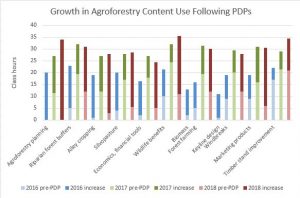
This program is unique in that the teachers who will begin using the agroforestry curriculum are "agricultural professionals" and educators reaching the generation of young farmers who will enter the field upon graduation. More than 60% of the graduating high school students who complete the agriculture program in high school in Missouri (more than 5,000 each year) will go on to continue their education or begin working in an agricultural profession immediately after high school graduation. Given this baseline observation, the 46 teachers who completed the agroforestry PDP in 2017, 2018, and 2019 will reach many hundreds of students in the course of their careers.
Combined outcomes from the 2017-2019 ASIs indicates that agroforestry will now have a place in these teachers' classrooms. Pre-ASI, these 46 teachers taught a total of 282 hours of agroforestry topics. Post-ASI, this figure increased to 668 hours, with substantial growth in all agroforestry-related topics measured.
The development of an Agroforestry Curriculum was also disseminated to the state Dept. of Education and FFA curriculum development groups to be added as "unit 10" of the forestry segment of an updated Agriculture Science Curriculum that was released to all teachers in Missouri in the fall of 2018. Materials made available online for public download are consistently viewed within and beyond Missouri, inspiring teachers in other states to adapt these materials for their own specific climate contexts.
Extensive online materials developed in 2020 in response to shifts to virtual teaching are now reaching a much wider audience. By sharing these agroforestry education materials strategically in various platforms (website, social media, webinars and virtual field days), we expect for these activities to continue to support educators who seek to expand their knowledge and understanding of these sustainable agriculture topics.
Agriculture teachers recognize the value of hands-on (and minds-on) learning. This was also true for the effectiveness of the curriculum materials and the PDP. The mushroom inoculation activity, that can be repeated with limited resources in a relatively small space as a student project, has already inspired 3 of the teachers who participated in the 2017 PDP to begin cultivating shiitake mushrooms with their students.
In the post-workshop survey, teachers also noted the value of this aspect of the program: "All of this is very well put together used as a complete unit. The combination of hands-on and classroom learning is what makes this work well"; "I hope to encourage students to pick up and implement this on their own farms/ land as SAE projects"; "I feel I am capable of teaching a lot of this information, especially with all the curriculum and resources given to us".
In 2018-19, an agriculture science teacher in Alaska who participated in the MU online agroforestry graduate certification program was inspired by the Missouri agroforestry teaching materials, and adapted the curriculum for his climate and student needs in Alaska, including expanded snow shelter/ buffers and silvopasture with elk and reindeer as part of his graduate certification project.
As was indicated in the post-workshop survey described above, teachers are interested in presenting content to their students that will be useful to them either as SAE projects (Supervised Agriculture Experience), or to help their students succeed in the Career Development Event (CDE) contests (in this case, the forestry contest). Since there is still a substantial amount of confusion about what agroforestry is for these teachers (before they attend the workshop), they expressed an unmet expectation to cover more "tree ID basics" and "more forestry CDE information". In order to address this need, we will provide additional required content for teachers to review prior to the workshop, and will continue to include a forestry curriculum review as part of the ASI program.
